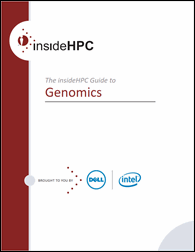This is the second article in a series from the insideHPC Guide to Genomics that looks at the benefits HPC brings to Genomics as well as many success stories.
Benefits to Organizations
Besides the obvious benefits to individuals, who will receive more targeted diagnosis and treatment, organizations that implement or contribute to personalized medicine can expect a number of benefits.
Innovation
IT departments of an organization that can provide for seamless access to the latest systems equipment will accelerate new discoveries. Researchers can focus on their scientific research without having to delve into IT issues. A well-designed and well-tuned architecture of the compute, storage, networking and access of large-scale resources can contribute to easy end-user access to HPC resources, as well as making maintenance and support easier for the IT organization.
Leadership
An organization that makes better use of its leading-edge IT infrastructure draws additional opportunities for new grants and improves its ability to recruit new researchers. State-of-the-art facilities, including the latest computing and storage systems, allow for researchers to concentrate on their new research with the latest tools. Organizations that are confident in their use of modern IT infrastructure can help other institutions as needed, by providing consulting on best practices as well as assisting in research opportunities.
Patient Outcomes
An organization that works directly with patients can demonstrate and quantify better patient outcomes, not only helping patients, but also increasing the organization’s visibility. Using the latest techniques in personalized medicine leads to better outcomes for patients, which in turn raises the bar for all competing organizations. As precision medicine enables treatment based on individual symptoms and diagnosis, there is less likelihood of a misdiagnosis and more options for the treatment of rare diseases. (The Center for Rare Childhood Diseases defines “rare” as fewer than five in a 10k population.)
Enablement
Researchers usually are consumers of all of the available computing power and storage capacity. When a more optimal solution is available for them to use, more complete simulations can be performed and more outcomes can be simulated. This not only allows for more personalized decisions to be made, but empowers experts in many fields to move their science forward. Advanced technology enables clinicians to work with larger amounts of data, create more realistic models and determine better treatment paths for individuals. This can also lead to the sharing of information and insights with a variety of organizations.
Next week we will look at the challenges to greater adoption of personalized medicine. If you prefer you download the complete insideHPC Guide to Genomics in PDF form by clicking here, courtesy of Dell and Intel.




